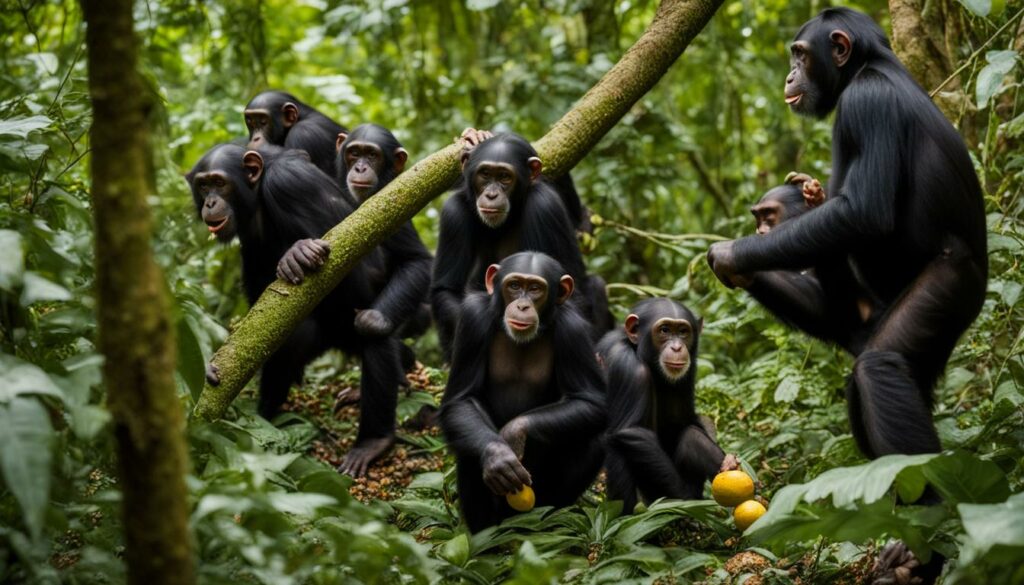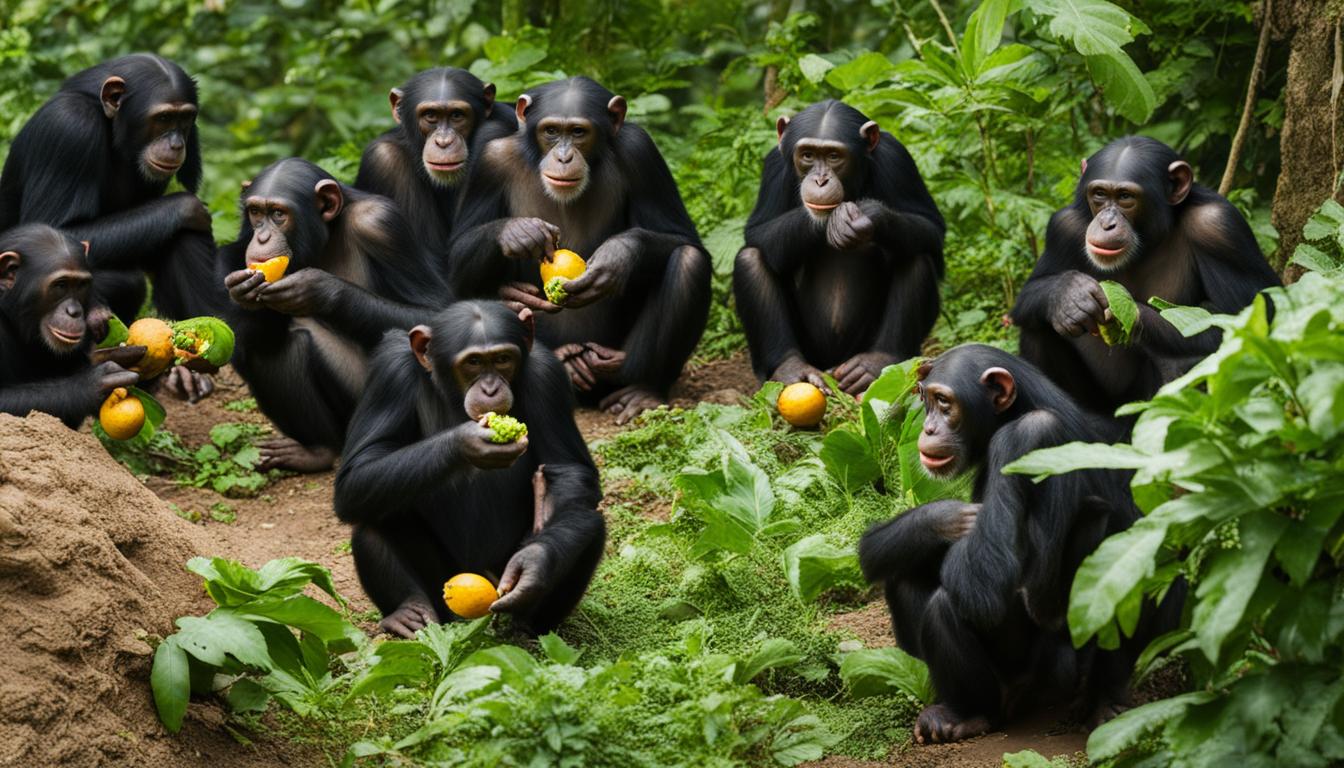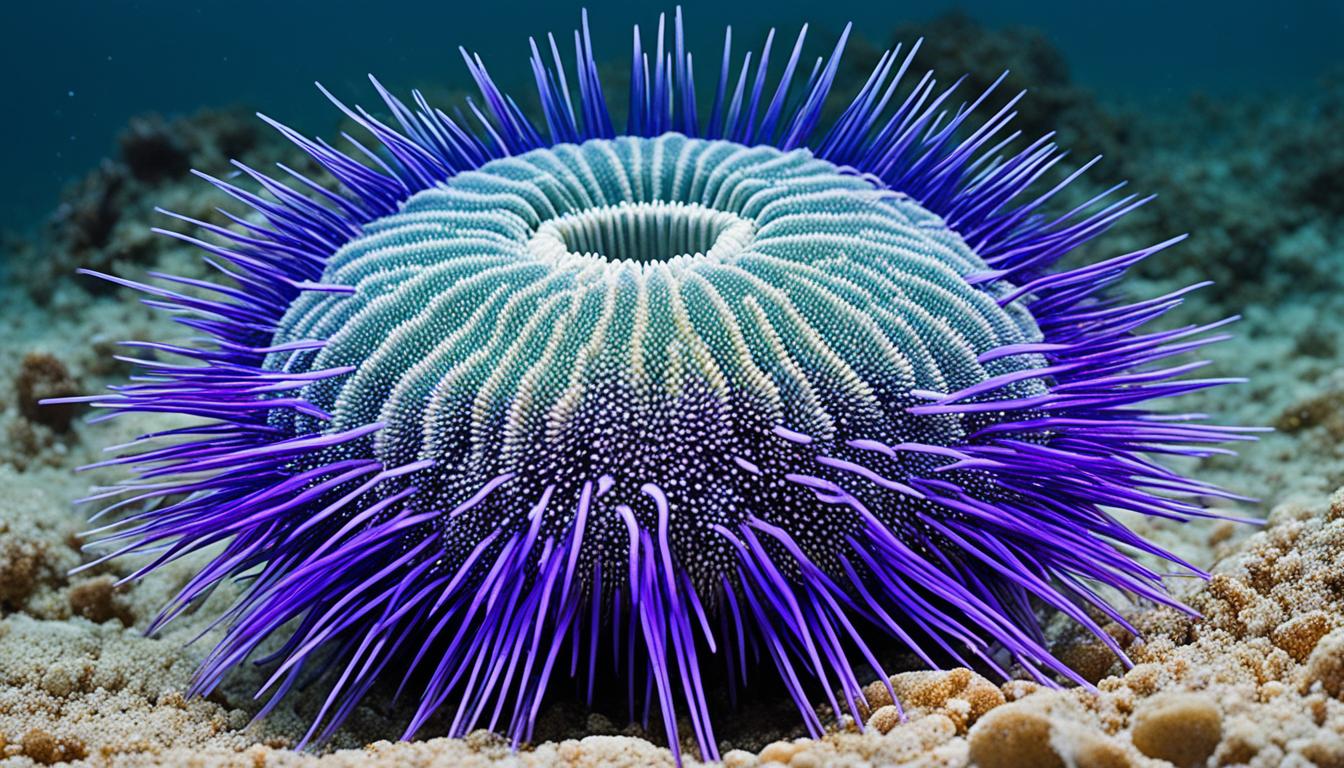Curious about what chimpanzees eat? Chimpanzees, like us, are omnivores with a diverse diet. They enjoy a wide variety of foods, both plant-based and animal sources. Understanding their eating habits and nutritional needs can give us insights into their fascinating foraging behavior and feeding patterns.
Chimpanzees primarily feast on fruits, seeds, nuts, leaves, flowers, and insects. They display remarkable intelligence when it comes to foraging, utilizing tools and employing creative strategies to find their next meal. In the wild, chimpanzees source their food from natural habitats, relying on a mix of seasonal fruits, nuts, and other wild food sources.
When fruits are scarce, chimpanzees turn to leaves, flowers, bark, and seeds for sustenance. They are also known to enjoy the occasional insect delicacy, like termites. Interestingly, chimpanzees possess a knowledge of medicinal plants, consuming specific ones for their digestive health, anti-malaria properties, and other medicinal benefits.
Chimpanzees are not solely herbivorous. They also indulge in meat and eggs, hunting and consuming them as part of their diet. Infant chimpanzees are initially fed specially formulated milk to meet their nutritional needs.
The diet of chimpanzees can vary depending on their location, seasonal availability of fruits, and individual preferences. Each chimpanzee has unique tastes and preferences, just like us humans.
Stay tuned for the next sections of this article to learn more about the chimpanzee diet at sanctuaries, their foraging behavior, and the role of nutrition in their care.
The Chimpanzee Diet at Chimp Haven
At Chimp Haven, a sanctuary for chimpanzees in Louisiana, the chimpanzee diet is carefully prepared to meet their nutritional needs. The diet consists of a variety of food items including chow, leafy greens, non-leafy greens, starches, fruits, and forage items. These components are selected to provide a balanced and healthy diet for the chimpanzees under the care of the sanctuary.
The chimpanzees at Chimp Haven are fed a protein biscuit called chow, which is specifically formulated for chimpanzees. They also receive leafy greens such as kale, and non-leafy greens like cucumbers. Starches like potatoes are included in their diet, along with a selection of fruits. Foraging is an important behavior for chimpanzees, and they are provided with forage items like nuts and seeds to engage in this natural behavior.
The Chimpanzee Diet at Chimp Haven: Sample Daily Menu
| Meal | Food Items |
|---|---|
| Breakfast | Chow, leafy greens, fruit |
| Lunch | Chow, non-leafy greens, starches |
| Afternoon Snack | Fruit, nuts, seeds |
| Dinner | Chow, leafy greens, fruit |
The diet at Chimp Haven is carefully planned and customized for each individual chimpanzee, taking into consideration their specific dietary needs and preferences. The sanctuary sources local seasonal produce and also grows its own with fruit trees and a greenhouse. This ensures that the chimpanzees have access to fresh and nutritious food throughout the year.
“The chimpanzees at Chimp Haven have specific dietary needs that are determined by the sanctuary’s veterinarian based on factors like caloric intake, age, and activity level.”
The dedicated staff at Chimp Haven ensures that the chimpanzees receive a balanced diet that supports their overall health and wellbeing. By providing a variety of food items and opportunities for foraging, they aim to replicate the natural diet and behaviors of chimpanzees in the wild.
Chimpanzee Foraging and Preferences
Chimpanzees exhibit fascinating foraging behavior and have distinct food preferences. In the wild, these intelligent primates spend a significant amount of time searching for food in their natural habitat. They are omnivorous frugivores, meaning they consume various types of produce as well as some animals. While they have a wide range of food preferences, chimpanzees are particularly fond of certain foods.
Chimpanzee Food Preferences
Chimpanzees have a fondness for leafy greens such as okra and romaine lettuce. These nutritious greens provide essential vitamins and minerals that contribute to their overall health. Additionally, chimpanzees have a strong affinity for fruits, with bananas being a consistent favorite among them. It’s interesting to note that the chimpanzees at Chimp Haven, a sanctuary in Louisiana, receive a daily banana as part of their diet.
Individual chimpanzees may develop specific tastes and preferences when it comes to food, much like humans. Some may have a preference for certain types of fruits or vegetables, while others may exhibit a liking for more savory items. This diversity in food preferences adds to the unique character of each chimpanzee and underscores their individuality as sentient beings.
Chimpanzees have a fondness for leafy greens such as okra and romaine lettuce. These nutritious greens provide essential vitamins and minerals that contribute to their overall health.
The sanctuaries where chimpanzees are cared for, such as Chimp Haven and Project Chimps, take into account the food preferences of these incredible creatures when planning their diets. By providing a balanced and varied selection of foods, they ensure that the chimpanzees receive the necessary nutrients to thrive. The knowledge of their favorite foods also aids in creating enrichment activities that stimulate their natural foraging behavior, promoting mental and physical well-being.
Summary
Chimpanzees display a remarkable ability to forage for food and exhibit distinct food preferences. While they are omnivorous frugivores, they particularly enjoy leafy greens like okra and romaine lettuce, as well as fruits such as bananas. Individual chimpanzees may have unique tastes and preferences when it comes to food, adding to their individuality. Sanctuaries like Chimp Haven and Project Chimps take these preferences into account when planning the chimpanzees’ diets and creating enrichment activities that promote natural foraging behavior. By understanding and respecting their food preferences, we can contribute to the well-being of these incredible primates.
| Chimpanzee Food Preferences | Examples |
|---|---|
| Leafy Greens | Okra, Romaine Lettuce |
| Fruits | Bananas, Apples, Oranges |
| Other Vegetables | Carrots, Bell Peppers, Cucumbers |
| Protein | Nuts, Seeds, Insects |
Image source:
The Chimpanzee Diet at Project Chimps
At Project Chimps, another chimpanzee sanctuary, the daily diet consists of three large meals and several snacks. The meals are individually portioned for each chimp, and lunch is scattered around their enclosures to promote natural foraging behavior. The sanctuary follows a primarily vegan diet for the chimpanzees, providing a variety of produce, roots, nuts, leaves, plants, flowers, and insects. The diet is carefully balanced by a Nutrition Committee, taking into consideration the specific needs of each chimpanzee. Supplements, like protein shakes, may be added for certain individuals, and special flavored items are used for chimpanzees who need to take medications. Along with fresh items, the chimpanzees receive Chimp Chow, a fortified biscuit that contains essential vitamins. The specific variety used is Mazuri Primate Basix Biscuit. The menu is adjusted seasonally based on produce availability, and the sanctuary also grows its own produce on their farmland. It costs $7 per day to feed each chimpanzee at Project Chimps.
Diet Composition at Project Chimps
The chimpanzees at Project Chimps enjoy a diverse diet that consists of various food groups. The following table provides an overview of the diet composition:
| Food Group | Examples |
|---|---|
| Produce | Apples, oranges, carrots, bell peppers |
| Browse | Leaves, bark, branches |
| Nuts and Seeds | Almonds, walnuts, sunflower seeds |
| Roots and Tubers | Sweet potatoes, carrots, beets |
| Insects | Mealworms, crickets, ants |
These food groups provide the chimpanzees with a balanced diet that meets their nutritional needs. The variety of produce ensures they receive an adequate intake of vitamins and minerals, while browse items help stimulate natural foraging behavior. Nuts and seeds are a source of healthy fats, and roots and tubers provide energy-rich carbohydrates. Insects add a protein component to their diet. The chimpanzees also receive fortified biscuits, like the Mazuri Primate Basix Biscuit, which contain essential vitamins and minerals. The combination of these food items ensures that the chimpanzees at Project Chimps have a well-rounded and nutritious diet.
Chimpanzee Foraging and Enrichment
Chimpanzee foraging behavior is a natural instinct for these intelligent primates. In sanctuaries like Chimp Haven and Project Chimps, efforts are made to provide opportunities for the chimpanzees to engage in their natural foraging abilities.
Enrichment activities are an important aspect of the care and wellbeing of chimpanzees. Food puzzles are often used as enrichment tools, stimulating the chimpanzees’ minds and encouraging their natural foraging behavior. These puzzles require the chimps to problem-solve and use their cognitive skills to access the treat hidden within.
“Foraging is a vital behavior for chimpanzees, and by providing enrichment activities like food puzzles, we are giving them the opportunity to engage in their natural instincts,” says Dr. Jane Goodall, renowned primatologist. “These activities not only keep them mentally and physically active but also provide them with a sense of fulfillment.”
Benefits of Foraging Enrichment:
- Stimulates natural behaviors: Foraging enrichment allows chimpanzees to engage in their instinctive behaviors, promoting a sense of normalcy in their sanctuary environment.
- Improves cognitive skills: The problem-solving aspect of food puzzles challenges chimpanzees’ cognitive abilities, keeping their minds sharp and adaptable.
- Reduces boredom and stress: By providing enrichment activities, sanctuaries help alleviate potential boredom and stress for the chimpanzees, promoting their overall wellbeing.
- Encourages physical activity: Foraging activities require physical movement, helping to keep the chimpanzees physically active and fit.
Table: Types of Foraging Enrichment Activities
| Enrichment Activity | Description |
|---|---|
| Food puzzles | A variety of puzzles that challenge the chimpanzees to problem-solve and access hidden treats. |
| Scatter feeding | Food items scattered around the enclosure to simulate natural foraging behavior. |
| Enrichment boxes | Boxes or containers filled with food that chimpanzees must manipulate or open to access the treats inside. |
In conclusion, providing opportunities for chimpanzees to engage in their natural foraging abilities through enrichment activities is crucial for their mental and physical wellbeing. Enrichment tools like food puzzles stimulate their minds, promote problem-solving skills, and reduce boredom and stress. Sanctuary staff and volunteers are dedicated to ensuring that these intelligent creatures have a fulfilling and enriched life, replicating their natural behavior in the wild as closely as possible.
The Role of Nutrition in Chimpanzee Care
Nutrition plays a crucial role in the care of chimpanzees in sanctuaries. Providing a balanced diet that meets their nutritional needs is essential for their overall health and wellbeing. Chimpanzees require a variety of nutrients to thrive, and their diet must be carefully planned and adjusted based on factors such as age, activity level, and weight management. Veterinarians and nutrition committees work together to determine the appropriate dietary requirements for each chimpanzee, ensuring that they receive the necessary caloric intake and nutrients.
Weight management is an important aspect of chimpanzee care, as maintaining a healthy weight is vital for their overall health. Just like humans, chimpanzees can be prone to obesity and related health issues if their caloric intake is not carefully monitored. By providing a balanced diet and monitoring their weight, sanctuaries can help prevent health problems and ensure the chimpanzees maintain an optimal weight.
Equally important is the consideration of individual needs when it comes to nutrition. Each chimpanzee is unique, with varying dietary preferences and requirements. Care staff take into account these individual needs and preferences to provide personalized care and nutrition. This tailored approach helps to ensure that each chimpanzee receives the specific nutrients they require for their overall health and wellbeing.

The Importance of a Balanced Diet
A balanced diet is vital for the proper development and function of chimpanzees. It includes a variety of plant-based foods, such as fruits, vegetables, and nuts, as well as some animal sources, such as insects. By providing a diverse range of foods, sanctuaries can ensure that the chimpanzees receive all the necessary nutrients, vitamins, and minerals they need to thrive.
Proper nutrition also supports the chimpanzees’ immune system, helping them stay healthy and ward off illnesses. It contributes to their overall energy levels, cognitive function, and digestive health. A well-balanced diet not only meets their nutritional needs but also helps to prevent deficiencies and promote optimal health and wellbeing.
In conclusion, nutrition plays a vital role in the care of chimpanzees in sanctuaries. A balanced diet that meets their nutritional needs, along with careful weight management, contributes to their overall health and wellbeing. By understanding the specific dietary requirements of each chimpanzee and providing personalized care, sanctuaries ensure that these incredible primates receive the nutrition they need to thrive.
Supporting Chimpanzee Nutrition in Sanctuaries
Providing proper nutrition for chimpanzees in sanctuaries is crucial for their overall health and wellbeing. However, the cost of feeding these intelligent creatures on a daily basis can be significant. That’s why support from donors and volunteers is essential for ensuring that sanctuaries like Chimp Haven and Project Chimps can meet the nutritional needs of their resident chimpanzees.
Donations play a vital role in supporting chimpanzee nutrition in sanctuaries. By contributing funds, individuals can help cover the expenses associated with providing a balanced diet for the chimpanzees. These funds are used to purchase a variety of food items, including fruits, vegetables, nuts, and forage materials. Donors can make a real difference in the lives of these incredible primates by supporting their nutritional needs.
Fundraising efforts are also crucial in raising awareness and generating support for chimpanzee nutrition in sanctuaries. By organizing events and campaigns, sanctuaries can engage the community and educate people about the importance of proper nutrition for chimpanzees. The funds raised through these efforts can be used to enhance the diet and overall care provided to the chimpanzees, ensuring their health and happiness.
Table: Donations vs. Nutritional Impact
| Donation Level | Nutritional Impact |
|---|---|
| $10 | Provides fresh fruits for one chimpanzee for a week |
| $50 | Covers the cost of a month’s supply of nuts for the sanctuary |
| $100 | Supports the purchase of leafy greens for the entire chimpanzee population for a week |
| $500 | Helps fund the maintenance of a sustainable foraging area for the chimpanzees |
| $1000 | Contributes to the development of a specialized diet plan for individual chimpanzees with specific nutritional needs |
Donating to chimpanzee sanctuaries is a tangible way to show support for the care and wellbeing of these incredible creatures. Contributions of any size can make a significant impact on the nutrition provided to chimpanzees in sanctuaries. By working together, we can ensure that these intelligent and sensitive animals receive the proper nourishment they need to live happy and healthy lives.
Conclusion
The chimpanzee diet is diverse, consisting of a variety of plant-based foods and some animal sources. Chimpanzees display unique foraging behaviors and have preferences for different types of food. Sanctuaries like Chimp Haven and Project Chimps play a crucial role in providing a balanced diet that meets the nutritional needs of the chimpanzees under their care.
Foraging activities and enrichment are essential for keeping chimpanzees mentally and physically stimulated. These activities replicate their natural behavior in the wild and contribute to their overall health and wellbeing. Nutrition is a vital aspect of chimpanzee care, and sanctuaries rely on the support of donors and volunteers to provide the necessary resources.
By supporting sanctuaries like Chimp Haven and Project Chimps, you can contribute to the health and wellbeing of chimpanzees. Your support helps ensure that these incredible primates receive the nutrition they need to thrive and create a better future for them. Together, we can make a difference in the lives of these intelligent creatures.
What are the common dietary habits and foraging behavior of chimpanzees?
Chimpanzee diet and foraging habits include a heavy reliance on fruits, supplemented with leaves, seeds, nuts, and occasional hunting for small animals. They often exhibit tool use to extract insects or honey from trees, displaying complex problem-solving skills. These dietary habits vary based on their native habitat and seasonal food availability.
FAQ
What do chimpanzees typically eat?
Chimpanzees have a diverse diet that includes fruits, seeds, nuts, leaves, flowers, insects, and occasionally meat and eggs.
Do chimpanzees eat only plants?
No, chimpanzees are omnivores and consume both plant-based and animal-based foods.
What are some specific foods that chimpanzees eat?
Chimpanzees enjoy fruits such as figs and bananas, nuts like oil palm, kola, and panda nuts, leafy greens like kale, and insects such as termites.
Do chimpanzees have dietary preferences?
Yes, individual chimpanzees may have specific tastes and preferences when it comes to their food choices, just like humans.
How is the chimpanzee diet managed in sanctuaries?
Sanctuaries like Chimp Haven and Project Chimps carefully plan and balance the chimpanzee diet based on their nutritional needs, age, and activity level.
How do sanctuary staff ensure chimpanzees receive a balanced diet?
The diet is determined by veterinarians and nutrition committees, and it includes a variety of produce, nuts, leaves, plants, insects, and fortified biscuits with essential vitamins.
Are chimpanzees provided with opportunities for foraging?
Yes, sanctuaries like Chimp Haven and Project Chimps scatter food for the chimpanzees to promote natural foraging behavior and mental stimulation.
How can individuals support chimpanzee nutrition in sanctuaries?
Donations and fundraising efforts contribute to the resources needed to provide a balanced diet for the chimpanzees in sanctuaries.










